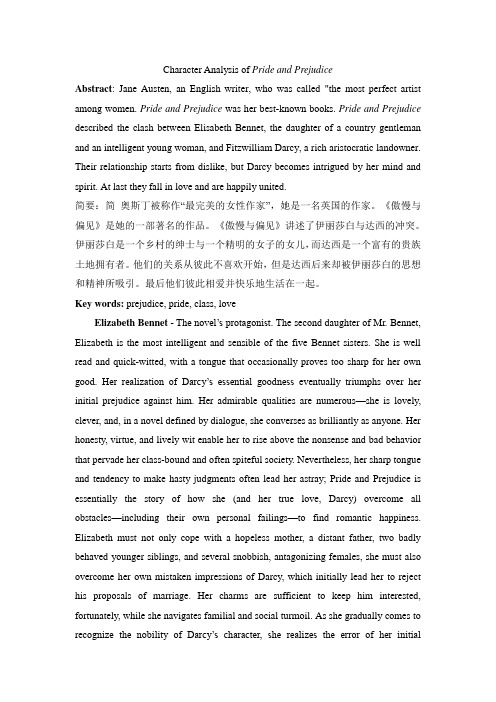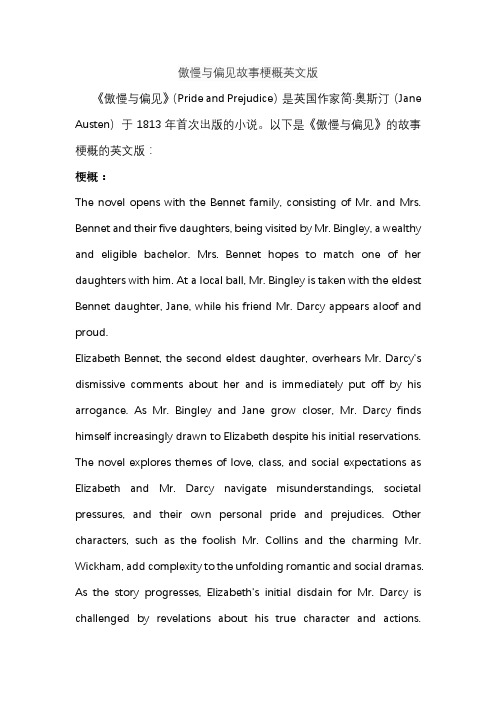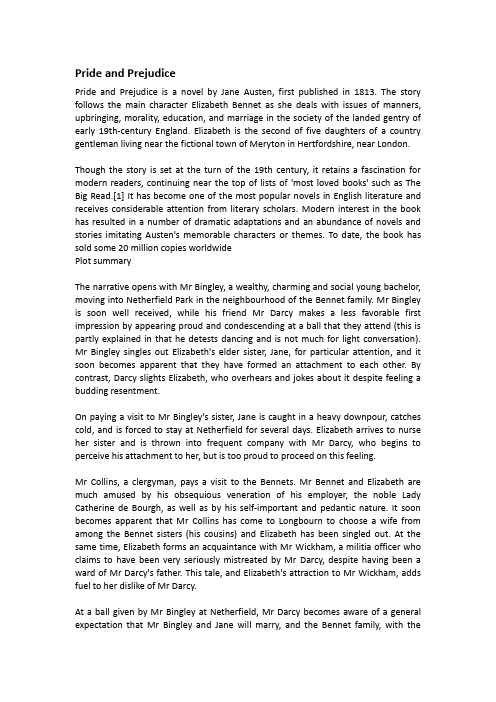Pride-and-Prejudice傲慢与偏见
傲慢与偏见(共16张PPT)

• 附近小镇的民团联队里有个英俊潇洒的青年军官威克姆,人人都夸他 ,伊丽莎白也对他产生了好感。一天,他对伊丽莎白说,他父亲是 达西家的总管,达西的父亲曾在遗嘱中建议达西给他一笔财产,从 而体面地成为一名神职人员而这笔财产却被达西吞没了。伊丽莎白 听后,对达西更加反感。
•
• 柯林斯夫妇请伊丽莎白去他们家作客,伊丽莎白在那里遇到,并且被邀去她的 罗辛斯山庄做客。不久,又见到了来那里过复活节的达西。达西无法抑制自己
• 班纳特先生没有儿子,根据当时法律,只有男性可以继承财 产,而班纳特家的女儿们仅仅只能得到五千英镑作为嫁妆, 因此他的家产将由远亲柯林斯(Collins)继承。柯林斯古板平庸 又善于谄媚奉承,依靠权势当上了牧师。他向伊丽莎白求婚 ,遭拒绝后,马上与她的密友夏洛特(Charlotte)结婚,这也给 伊丽莎白带来不少烦恼。
作者简介
• 奥斯汀终身未婚,家道小康。由于居住在乡村小镇, 接触到的是中小地主、牧师等人物以及他们恬静、舒 适的生活环境,因此她的作品里没有重大的社会矛盾 。她以女性特有的细致入微的观察力,真实地描绘了 她周围世界的小天地,尤其是绅士淑女间的婚姻和爱 情风波。她的作品格调轻松诙谐,富有喜剧性冲突, 深受读者欢迎。在英国小说的发展史上有承上启下的 意义,被誉为地位“可与莎士比亚平起平坐”的作家。
傲慢与偏见
《傲慢与偏见》是简·奥斯汀的代表作。这部作品以 日常生活为素材,一反当时社会上流行的感伤小说的 内容和矫揉造作的写作方法,生动地反映了18世纪末 到19世纪初处于保守和闭塞状态下的英国乡镇生活 和世态人情。这部社会风情画式的小说不仅在当时 吸引着广大的读者,时至今日,仍给读者以独特的 艺术享受。 也有根据书本改编的电影.
先后两次求婚的不同态度,实际上反映了女性对人格独立和 平等权利的追求。这是伊丽莎白这一人物形象的进步意义。
Character Analysis of Pride and Prejudice傲慢与偏见人物性格解读

Character Analysis of Pride and PrejudiceAbstract: Jane Austen, an English writer, who was called "the most perfect artist among women. Pride and Prejudice was her best-known books. Pride and Prejudice described the clash between Elisabeth Bennet, the daughter of a country gentleman and an intelligent young woman, and Fitzwilliam Darcy, a rich aristocratic landowner. Their relationship starts from dislike, but Darcy becomes intrigued by her mind and spirit. At last they fall in love and are happily united.简要:简奥斯丁被称作“最完美的女性作家”,她是一名英国的作家。
《傲慢与偏见》是她的一部著名的作品。
《傲慢与偏见》讲述了伊丽莎白与达西的冲突。
伊丽莎白是一个乡村的绅士与一个精明的女子的女儿,而达西是一个富有的贵族土地拥有者。
他们的关系从彼此不喜欢开始,但是达西后来却被伊丽莎白的思想和精神所吸引。
最后他们彼此相爱并快乐地生活在一起。
Key words: prejudice, pride, class, loveElizabeth Bennet - The novel’s protagonist. Th e second daughter of Mr. Bennet, Elizabeth is the most intelligent and sensible of the five Bennet sisters. She is well read and quick-witted, with a tongue that occasionally proves too sharp for her own good. Her realization of Darcy’s essential goodness eventually triumphs over her initial prejudice against him. Her admirable qualities are numerous—she is lovely, clever, and, in a novel defined by dialogue, she converses as brilliantly as anyone. Her honesty, virtue, and lively wit enable her to rise above the nonsense and bad behavior that pervade her class-bound and often spiteful society. Nevertheless, her sharp tongue and tendency to make hasty judgments often lead her astray; Pride and Prejudice is essentially the story of how she (and her true love, Darcy) overcome all obstacles—including their own personal failings—to find romantic happiness. Elizabeth must not only cope with a hopeless mother, a distant father, two badly behaved younger siblings, and several snobbish, antagonizing females, she must also overcome her own mistaken impressions of Darcy, which initially lead her to reject his proposals of marriage. Her charms are sufficient to keep him interested, fortunately, while she navigates familial and social turmoil. As she gradually comes to rec ognize the nobility of Darcy’s character, she realizes the error of her initialprejudice against him.Fitzwilliam Darcy - A wealthy gentleman, the master of Pemberley, and the nephew of Lady Catherine de Bourgh. Though Darcy is intelligent and honest, his excess of pride causes him to look down on his social inferiors. Over the course of the novel, he tempers his class-consciousness and learns to admire and love Elizabeth for her strong character. Darcy is Elizabeth’s male counterpart. The narrator relates Elizabeth’s point of view of events more often than Darcy’s, so Elizabeth often seems a more sympathetic figure. The reader eventually realizes, however, that Darcy is her ideal match. Intelligent and forthright, he too has a tendency to judge too hastily and harshly, and his high birth and wealth make him overly proud and overly conscious of his social status. Indeed, his haughtiness makes him initially bungle his courtship. When he proposes to her, for instance, he dwells more on how unsuitable a match she is than on her charms, beauty, or anything else complimentary. Her rejection of his advances builds a kind of humility in him. Darcy demonstrates his continued devotion to Elizabeth, in spite of his distaste for her low connections, when he rescues Lydia and the entire Bennet family from disgrace, and when he goes against the wishes of his haughty aunt, Lady Catherine de Bourgh, by continuing to pursue Elizabeth. Darcy proves himself worthy of Elizabeth, and she ends up repenting her earlier, overly harsh judgment of him.Mr. Bennet - The patriarch of the Bennet family, a gentleman of modest income with five unmarried daughters. Mr. Bennet has a sarcastic, cynical sense of humor that he uses to purposefully irritate his wife. Though he loves his daughters (Elizabeth in particular), he often fails as a parent, preferring to withdraw from the never-ending marriage concerns of the women around him rather than offer help.Mrs. Bennet - Mr. Bennet’s wife, a foolish, noisy woman whose only goal in life is t o see her daughters married. Because of her low breeding and often unbecoming behavior, Mrs. Bennet often repels the very suitors whom she tries to attract for her daughters.Mrs. Bennet - Mr. Bennet’s wife, a foolish, noisy woman whose only goal in lif e is to see her daughters married. Because of her low breeding and often unbecomingbehavior, Mrs. Bennet often repels the very suitors whom she tries to attract for her daughters.Pride and Prejudice contains one of the most cherished love stories in English literature: the courtship between Darcy and Elizabeth. Elizabeth’s pride makes her misjudge Darcy on the basis of a poor first impression, while Darcy’s prejudice against Elizabeth’s poor social standing blinds him, for a time, to her many virtues. (Of course, one could also say that Elizabeth is guilty of prejudice and Darcy of pride—the title cuts both ways.) Darcy and Elizabeth’s realization of a mutual and tender love seems to imply that Austen views love as something independent of these social forces, as something that can be captured if only an individual is able to escape the warping effects of hierarchical society.The theme of class is related to reputation, in that both reflect the strictly regimented nature of life for the middle and upper classes in Regency England. The lines of class are strictly drawn. In a sense, Pride and Prejudice is the story of two courtships—those between Darcy and Elizabeth and between Bingley and Jane. Within this broad structure appear other, smaller courtships: Mr. Collins’s aborted wooing of Elizabeth, followed by his successful wooing of Charlotte Lucas; Miss Bingley’s unsuccessful attempt to attract Darcy; Wickham’s pursuit first of Elizabeth, then of the never-seen Miss King, and finally of Lydia. Courtship therefore takes on a profound, if often unspoken, importance in the novel. Marriage is the ultimate goal, courtship constitutes the real working-out of love. Courtship becomes a sort of forge of a person’s personality, and each courtship becomes a microcosm for different sorts of love (or different ways to abuse love as a means to social advancement).References:/lit/pride/canalysis.html/viewpaper/6941.html。
傲慢与偏见故事梗概英文版

傲慢与偏见故事梗概英文版《傲慢与偏见》(Pride and Prejudice)是英国作家简·奥斯汀(Jane Austen)于1813年首次出版的小说。
以下是《傲慢与偏见》的故事梗概的英文版:梗概:The novel opens with the Bennet family, consisting of Mr. and Mrs. Bennet and their five daughters, being visited by Mr. Bingley, a wealthy and eligible bachelor. Mrs. Bennet hopes to match one of her daughters with him. At a local ball, Mr. Bingley is taken with the eldest Bennet daughter, Jane, while his friend Mr. Darcy appears aloof and proud.Elizabeth Bennet, the second eldest daughter, overhears Mr. Darcy's dismissive comments about her and is immediately put off by his arrogance. As Mr. Bingley and Jane grow closer, Mr. Darcy finds himself increasingly drawn to Elizabeth despite his initial reservations. The novel explores themes of love, class, and social expectations as Elizabeth and Mr. Darcy navigate misunderstandings, societal pressures, and their own personal pride and prejudices. Other characters, such as the foolish Mr. Collins and the charming Mr. Wickham, add complexity to the unfolding romantic and social dramas. As the story progresses, Elizabeth's initial disdain for Mr. Darcy is challenged by revelations about his true character and actions.Similarly, Mr. Darcy must confront his own pride and rethink his attitudes towards those he considers beneath him.In the end, after various twists and turns, misunderstandings are cleared, and Elizabeth and Mr. Darcy come to understand and appreciate each other. Their eventual union is a triumph over the societal norms and prejudices that initially kept them apart.Note: This is a brief summary of the novel, and the richness of the characters and social commentary in "Pride and Prejudice" is best appreciated by reading the full text.。
《傲慢与偏见》译文对比分析

《傲慢与【2 】成见》(节选一)Pride and Prejudiceby Jane Austen(An Except from Chapter One)译文比较剖析节选文章背景:小乡绅贝内特有五个待字闺中的令媛,贝内特太太成天操心着为女儿物色称心如意的丈夫. 新来的邻人宾利(Bingley)是个有钱的单身汉,他立刻成了贝内特太太追猎的目的.1.It’s a truth universally acknowledged, that a single man in possession of agood fortune, must be in want of a wife.译文一:凡是有钱的单身汉,总想娶位太太,这已经成了一条环球公认的道理.译文二:有钱的单身汉总要娶位太太,这是一条环球公认的真谛.剖析:从译文的精确性来看,译文一和译文二都表达的很精确,担从翻译的句子构造来讲,译文二的“有钱的单身汉总要娶位太太”与译文一的“凡是有钱的单身汉,总想要娶位太太”比拟说话更简洁,表达意思更清楚晴明.2.However little known the feelings or views of such a man may be on his firstentering a neighborhood, this truth is so well fixed in the minds of the surrounding families that he is considered as the rightful property of some one or other of their daughters.译文一:如许的单身汉,每逢新搬到一个地方,四邻八舍固然完整不懂得他的性格若何,看法若何,可是,既然如许的一条真谛早已在人们心中根深蒂固,是以人们老是把他看作是本身某一个女儿理所应得的一笔财产.译文二:这条真谛还真够深刻人心的,每逢如许的单身汉新搬到一个地方,四邻八舍的人家尽管对他的性格见识一窍不通,却把他视为某一个女儿的正当财产.译文一中说“如许的一条真谛早已在人们心中根深蒂固”译文二“这条真谛还真够深刻人心的”,译文一的译法比较书面化,应用了“根深蒂固”,译文二“深刻人心”,两种译法比拟较,我更偏向第一种书面化的译法.3.”My dear Mr. benne” said his lady to him one day ,”have you heard that nether field park is let at last?”译文一:有一天班纳特太太对她的丈夫说:“我的好老爷,尼日斐花圃终于租出去了,你据说过没有?”译文二:“友爱的贝特师长教师”一天,贝纳特太太对师长教师说:“你有没有据说内瑟费尔德庄园终于租出去了:”译文一中说“我的好老爷”译文二“友爱的贝内特师长教师”很显著可以看出前者更白话化,相符两人之间的关系,二后者显得生硬,让人感到不到两人的密切关系. (王珍)4.Mr. Bennet replied that he had not.译文一:纳特师长教师答复道,他没有据说过.译文二:纳特师长教师答复道,没有据说过.剖析:译文一语意隐约,译文中的“他”是指纳特师长教师,照样前文提到的其他主人公,引起语意的混杂,歧义.译文二就相对简洁清楚明了,便于懂得.5.”But it is,” returned she:” for Mrs. long has just been here, and she told me all about it.”译文一:“的确租出去了,”他说,“朗格太太方才上这来过,她把这件工作的底细,一五一十地都告知了我.”译文二:“的确租出去了,”太太说道.“朗太太方才来过,她把这事一五一十地全告知我了.”剖析:二译文比拟,译文一中的“这儿”和“来过”以及“底细”和“一五一十地告知我”是反复表达,使句子包袱罗嗦,译文二思绪更清楚清楚明了,表达简洁顺畅,瓜熟蒂落,懂得起来更轻易.6.Mr. Bennet made no answer.译文一:班纳特师长教师没有理睬他.译文二:班纳特师长教师没有作答.剖析:译文一的情感表达有误差,“没有理睬他”给人感到措辞人的表达带有不良情感,语气很硬,比拟而言,译文二更贴切.7.”Do not you want to know who has taken it?” cried his wife impatiently.译文一:“你岂非不想知道是谁租去的吗?”太太不耐心地嚷起来了.译文二:“岂非你不想知道是谁租去的吗?”太太不耐心地嚷起来了.剖析:比较二翻译,译文一中“你岂非“和译文二中”岂非你“的语序用的不一样,译文二语气更凸起措辞人的生气和不耐心,情感更贴切,便于读者懂得,译文一的表达就减色于译文二了.8.”You want to tell me, and I have no objection to hearing it.”译文一:“既然是你要说给我听,我听听也无妨.“译文二:“既然你要告知我,我听听也无妨.“剖析:译文一中的“说给我听“没有译文二中的”告知我“表达直接.9.This was invitation enough .译文一:这句话是够勉励他讲下去了.译文二:这句话足以引逗她讲下去了.(1)意译原文中的”invitation”被译为“勉励她讲下去”表现意译.译者不拘一格,自由而流利的再现了原文内在.(2)换形译法原文中”invitation”为名词性质,为而被译为“勉励她讲下去”为动词性质.译文二这句话足以逗引太太讲下去了.(1)意译原文中的”invitation”被译为“逗引太太讲下去”表现意译.译者不拘一格,自由而流利的再现了原文内在.(2)换形译法原文中”invitation”为名词性质,为而被译为“逗引太太讲下去”为动词性质.10. “Why, my dear, you must know, Mrs. Long says that Neth er field is taken bya young man of large fortune from the north of England; that he came down on Monday in a chaise and four to see the place, and was so much delighted with it that he agreed with Mr. Morris immediately; that he is to take possession before Michaelmasl, and some of his servants are to be in the house by the end of next week.”译文一“哦,友爱的,你得知道,朗格太太说,租尼日斐花圃的是个阔少爷,他是英格兰北部的人;据说他礼拜一那天,乘着一辆驷马大轿车来看房子,看得异常中意,当场就和莫理斯师长教师谈妥了;他要在‘米迦勒节’以前搬进来,打算下个周末先叫几个用人来住.“(1)意译,“Why”翻译为“哦”表现了灵巧自由的翻译办法,使加倍相符原文语境.(2)增词译法,增长“据说”“打算”“看得”“那天”以表达原文内在意义使译文加倍流利,加强可读性.(3)省词译法,将原文中”with it ”未译出,相符汉语表达习惯,使译文流利.(4)换序译法,将原文时光状语” by the end of next week”在译文中提前,相符汉语将状语提前的表达习惯,相符中文逻辑思维.(5)转性译法,将原文中”in” 译为“住”,将介词转译为动词,相符英美国度比较爱好用介词,而汉语则习习用动词表达.(6)断句译法将原文”Mrs. Long says that Netherfield is taken by a young man of large fortune from the north of England; that he came down on Monday in a chaise and four to see the place,and was so much delighted with it that he agreed with Mr. Morris immediately”两个长句译为多个短句,使译文易懂得.(7)转态译法将原文中”Netherfield is taken by a young man of large fortune”译为语态由被动转为自动,相符汉语表达习惯.译文二“哦,友爱的,你应当知道,朗太太说,内瑟菲尔德让英格兰北部的一个阔少爷租去了;他礼拜一那天乘坐一辆驷马马车来看房子,看得异常中意,当下就和莫理斯师长教师讲妥了;他打算赶在米迦勒节以前搬进新房,下周末以前打发几个用人先住进来.”(1)意译,“Why”翻译为“哦”表现了灵巧自由的翻译办法,使加倍相符原文语境.(2)增词译法,增长“那天”“看得”“新房”“打算”“打发”,加强译文可读性和连贯性. (3)省词译法,将原文中”with it”未译出,相符汉语表达习惯,使译文流利.(4)换序译法,将原订婚语”of large fortune” 地点状语”from the north of England”时光状语”on Monday” 方法状语”in a chaise”在翻译时分离提前,并先翻译时光状语后翻译方法状语,相符汉语表达习惯,使译文流利.(5)断句译法,将原文”that he came down on Monday in a chaise and f our to see the place,and was so much delighted with it that he agreed with Mr. Morris immediately”分为3个短句译完,是译文浅易易懂.11. “What’s his name?”译文一“这人叫什么名字?”(1)翻译多样性,“name”有“名字.姓,姓名.名称”之意,而在译文中被译为“名字”.(2)意译“his”译为“这人”翻译灵巧自由并且忠诚于原文.译文二“他姓什么?”(1)翻译多样性“name”有“名字.姓,姓名.名称”之意,而在译文中被译为“姓”. 12. “Bingley.”译文一“彬格莱.”译文二“宾利.”(1)二者表现了翻译多样性.13.”Is he married or single?”译文一“有太太的呢,照样个单身汉?(1)转性译法“single”在原文中应为形容词性质,而在一文中译为“单身汉”是名词性质.(2)断句译法将原文译为两个短句,浅易易懂,自由灵巧.译文二“成亲了照样单身?”(1)直译(2)将”married”译为“成亲了”具有中国文化特点.(郭赛赛)14. “Oh! Single, my dear, to be sure! A single man of large fortune; four or five thousand a year. What a fine thing for our girls!”译文一:“噢!是个单身汉,友爱的,确确切实是个单身汉!一个有钱的单身汉;每年有四五千镑的收入.真是女儿们的福泽!”译文四:“哦,是个单身汉,友爱的,确定是个单身汉!是个失去一大笔财产的单身汉,一年的收入就有四五千英镑呢.这对我们的女儿来说,真是天赐良机啊!”译文六:“哦,单身,我友爱的,一点儿不错!一个十分富有的单身汉,每年有四五千镑的收入,这对咱们的几个姑娘是件多好的事呀!”比较:①这句中三句都有若干的增词译法,例如,译文一.四中画下划线部分.②对于译文一.四来说,第一句前边已经说了“是个单身汉”,后面又说“·······是个单身汉”,在汉语中看来有点烦琐,小我以为译文六翻译较好.③”What a fine thing for our girls!”对于“fine thing”这个词,译文一“福泽”,译文四“天赐良机”,译文六“好的事”,小我以为,在这里既然是做媒的功德,译文一和译文四翻译比较适合,单纯的说是“功德”有些苍白.15. “How so? How can it affect them?”译文一:“这怎么说?关女儿们什么事?”译文四:“何故见得?这对她们来说有什么关系?”译文六:“怎么个好法儿?这和她们有什么关系?”比较:①”How so?...”在这里确定是一个省略句,上文说这是女儿们的福泽,天赐良机,下面贝内特师长教师应当提出困惑,译文一加倍的白话化,翻译比较适合16. “My dear Mr. Bennet,” replied his wife, “how can you be so tiresome! Youmust know that I am thinking of his marrying one of them.”译文一:“我的好老爷,”太太答复道,“你怎么这么叫人憎恶!告知你吧,我正在计算,他如果挑中我们的一个女儿做老婆,可多好!”译文四:“友爱的贝内特师长教师,”他的老婆答复说,“你怎么这么不开窍?你应当明确,我正计算着,他能将我们的谁人女儿去曩昔呢.”译文六:“我友爱的贝内特师长教师,”太太答复说,“你怎么这么不开窍呀!你要知道,我是在想他会娶她们之中的哪一个呢.”比较:①既然是在本身家中,喊本身的师长教师为贝内特师长教师有点陌生,而译文一中“我的好老爷”比较相符汉语的表达习惯②tiresome本身是“令人腻烦,憎恶”的意思,但这里贝内特太太显然不是这个意思,译文四和译文六译法比较好,“不开窍”③最后一句中有个从句,三句翻译都说得曩昔,贝内特太太计算着把本身的一个女儿嫁给邻人的单身汉.(张蝶媛)17.”Is that his design in settling here?”译文一采用了断句译法,将一句话译成了两个分句,即“他住到这来,就是为了这个打算吗?”译文二则采用了直译法,保持了原文的内容与情势,直译成了“他搬到这里就是为了这个打算?”18.”Design! nonsense, how can you talk so! But it is very likely that he may fall in love with one of them, and therefore you must visit him as soon as he comes.”译文一采用了省词译法,如将“how can you talk so”译成“这是哪的话”省译了“you”,同时也采用了意译法,转变了原句的构造与内容.将“and therefore you must visit him as soon as he comes.”译成“他一搬来,你就得去访问访问他.”省译了“andtherefore”,同时采用了断句译法,将一个句子译成了两个分句.译文二采用了直译法.按照原文的内容与情势得出译文.19.”I see no occasion for that. You and the girls may go, or you may send them by themselves, which perhaps will be still better, for as you are as handsome as any of them, Mr. Bingley might like you the best of the party.”在对“Mr. Bingley might like you the best of the party”一句的翻译中,译文一.二均采用了增词译法,译文一增长了“你去了”,译文二增长了“你一去”.在对“for as you are as handsome as any of them”一句的翻译中,译文一采用了断句译法,将原句译成了两个分句,同时采用了意译法,加强了可读性.译文二则采用了直译法,按照原文的内容与构造得出了译文.(卢乔)。
Pride-and-Prejudice-傲慢与偏见中英文双语简介

Pride and PrejudicePride and Prejudice is a novel by Jane Austen, first published in 1813. The story follows the main character Elizabeth Bennet as she deals with issues of manners, upbringing, morality, education, and marriage in the society of the landed gentry of early 19th-century England. Elizabeth is the second of five daughters of a country gentleman living near the fictional town of Meryton in Hertfordshire, near London. Though the story is set at the turn of the 19th century, it retains a fascination for modern readers, continuing near the top of lists of 'most loved books' such as The Big Read.[1] It has become one of the most popular novels in English literature and receives considerable attention from literary scholars. Modern interest in the book has resulted in a number of dramatic adaptations and an abundance of novels and stories imitating Austen's memorable characters or themes. To date, the book has sold some 20 million copies worldwidePlot summaryThe narrative opens with Mr Bingley, a wealthy, charming and social young bachelor, moving into Netherfield Park in the neighbourhood of the Bennet family. Mr Bingley is soon well received, while his friend Mr Darcy makes a less favorable first impression by appearing proud and condescending at a ball that they attend (this is partly explained in that he detests dancing and is not much for light conversation). Mr Bingley singles out Elizabeth's elder sister, Jane, for particular attention, and it soon becomes apparent that they have formed an attachment to each other. By contrast, Darcy slights Elizabeth, who overhears and jokes about it despite feeling a budding resentment.On paying a visit to Mr Bingley's sister, Jane is caught in a heavy downpour, catches cold, and is forced to stay at Netherfield for several days. Elizabeth arrives to nurse her sister and is thrown into frequent company with Mr Darcy, who begins to perceive his attachment to her, but is too proud to proceed on this feeling.Mr Collins, a clergyman, pays a visit to the Bennets. Mr Bennet and Elizabeth are much amused by his obsequious veneration of his employer, the noble Lady Catherine de Bourgh, as well as by his self-important and pedantic nature. It soon becomes apparent that Mr Collins has come to Longbourn to choose a wife from among the Bennet sisters (his cousins) and Elizabeth has been singled out. At the same time, Elizabeth forms an acquaintance with Mr Wickham, a militia officer who claims to have been very seriously mistreated by Mr Darcy, despite having been a ward of Mr Darcy's father. This tale, and Elizabeth's attraction to Mr Wickham, adds fuel to her dislike of Mr Darcy.At a ball given by Mr Bingley at Netherfield, Mr Darcy becomes aware of a general expectation that Mr Bingley and Jane will marry, and the Bennet family, with theexception of Jane and Elizabeth, make a public display of poor manners and decorum. The following morning, Mr Collins proposes marriage to Elizabeth, who refuses him, much to her mother's distress. Mr Collins recovers and promptly becomes engaged to Elizabeth's close friend Charlotte, a homely woman with few prospects. Mr Bingley abruptly quits Netherfield and returns to London, and Elizabeth is convinced that Mr Darcy and Mr Bingley's sister have conspired to separate him from Jane.In the spring, Elizabeth visits Charlotte and Mr Collins in Kent. Elizabeth and her hosts are frequently invited to Rosings Park, home of Lady Catherine de Bourgh, Darcy's aunt; coincidentally, Darcy also arrives to visit. Darcy again finds himself attracted to Elizabeth and impetuously proposes to her. Elizabeth, however, has just learned of Darcy's role in separating Mr Bingley from Jane from his cousin Colonel Fitzwilliam. She angrily rebukes him, and a heated discussion follows; she charges him with destroying her sister's happiness, with treating Mr Wickham disgracefully, and with having conducted himself towards her in an ungentleman-like manner. Mr Darcy, shocked, ultimately responds with a letter giving a good account of (most of) his actions: Wickham had exchanged his legacies for a cash payment, only to return after gambling away the money to reclaim the forfeited inheritance; he then attempted to elope with Darcy's young sister, thereby to capture her fortune. Regarding Mr Bingley and Jane, Darcy claimed he had observed no reciprocal interest in Jane for Bingley. Elizabeth later came to acknowledge the truth of Darcy's assertions.Some months later, Elizabeth and her Aunt and Uncle Gardiner visit Pemberley, Darcy's estate, believing he will be absent for the day. He returns unexpectedly, and though surprised, he is gracious and welcoming. He treats the Gardiners with great civility; he introduces Elizabeth to his sister, and Elizabeth begins to realise her attraction to him. Their reacquaintance is cut short, however, by news that Lydia, Elizabeth's sister, has run away to elope with Mr Wickham. Elizabeth and the Gardiners return to Longbourn, where Elizabeth grieves that her renewed acquaintance with Mr Darcy will end because of her sister's disgrace.Lydia and Wickham are soon found, then married by the clergy; they visit Longbourn, where Lydia lets slip that Mr Darcy was responsible for finding the couple and negotiating their marriage—at great expense to himself. Elizabeth is shocked but does not dwell further on the topic due to Mr Bingley's return and subsequent proposal to Jane, who immediately accepts.Lady Catherine de Bourgh later bursts in on Longbourn; intending to thwart local rumour, she warns Elizabeth against marrying Mr Darcy. Elizabeth refuses her demands. Disgusted, Lady Catherine leaves and drops by to inform her nephew on Elizabeth's abominable behaviour. However, this lends hope to Darcy that Elizabeth's opinion of him may have changed. He travels to Longbourn and proposes again; and now Elizabeth accepts.Major themesMany critics take the novel's title as a starting point when analysing the major themes of Pride and Prejudice; however, Robert Fox cautions against reading too much into the title because commercial factors may have played a role in its selection. "After the success of Sense and Sensibility, nothing would have seemed more natural than to bring out another novel of the same author using again the formula of antithesis and alliteration for the title. It should be pointed out that the qualities of the title are not exclusively assigned to one or the other of the protagonists; both Elizabeth and Darcy display pride and prejudice."[5]A major theme in much of Austen's work is the importance of environment and upbringing on the development of young people's character and morality.[6] Social standing and wealth are not necessarily advantages in her world, and a further theme common to Jane Austen's work is ineffectual parents. In Pride and Prejudice, the failure of Mr and Mrs Bennet as parents is blamed for Lydia's lack of moral judgment; Darcy, on the other hand, has been taught to be principled and scrupulously honourable, but he is also proud and overbearing.[6] Kitty, rescued from Lydia's bad influence and spending more time with her older sisters after they marry, is said to improve greatly in their superior society内容简介说故事最主要是围绕着18世纪末19世纪初,英国地主乡绅贵族的求爱和婚姻问题。
《傲慢与偏见》反讽赏析

018 大观 2015.09
大观 文艺评论
当代文学视域ቤተ መጻሕፍቲ ባይዱ的新移民文学
侯君 (沈阳大学外国语学院 辽宁 沈阳 110000)
摘要:新移民文学在各种历史和现实的因素的综合影响下,按照自身的特定轨迹向前推进,并演绎出清晰可见的发展脉络。本文从共时的 横向关联上,就新移民文学的特质加以探析,从中探寻其对中国当代文学发展的意义。
这样兴许更好,因为跟女儿们比起来,她们 的容貌没有哪个都不能强得过你,你一去, 宾利先生没准看中你哩。
这段话话也选自第一段:贝纳特太太听 说有家境富裕的单身汉来到自己的村庄,顿 时十分兴奋,觉得这给自己的女儿们提供了 一个绝好的机会。为了实现自己的计划,她 极力想劝说丈夫去拜访宾利先生。然而,为 了逗弄自己的太太,贝纳特先生故意卖关子, 尖酸刻薄地氛围讽刺她一番。
新移民文学从破土而出至繁华于世,按 其时间线索以及文学表现内容的变化,大致 可以划分为以下三个阶段:
第一阶段:积淀期。改革开放后第一批 走出国门的中国人负载着创伤、贫困等种种 记忆。尽管他们大都怀有向往新生活的理想, 但在骤然进入一个全然不同的社会环境和遭 遇两种文化的强烈冲突时很容易陷入迷失之 中。这一批出国者 的生存体验从初踏上异域 土壤时的狂喜继而转向面对生存问题的无奈
和窘迫,此时新移民文学的书写充满了困惑、 漂泊、焦虑的主题。期间主要的代表作有苏 炜的《背影》,查建英的《丛林下的冰河》, 周励的《曼哈顿的中国女人》,曹桂林的《北 京人在纽约》等等。在这一时期,大批移民 迫于生计不得不远离文学,经济实力不足迫 使海外华人作家群体暂时走入沉寂。尽管新 移民文学在这一阶段尚处在稚幼期,数量上 也没有形成规模效应,但是作品中书写的新 移民形象,他们在异域文化中勇于拼搏开拓 的精神却极具鼓舞他人的励志作用。
Pride and Prejudice

THE first week of their return was soon gone.The second began.It was the last of the regiment ’s stay in Meryton ,and all the young ladies in the neighbourhood were drooping apace.The dejection was almost universal.The elder Miss Bennets alone were still able to eat ,drink ,and sleep ,and pursue the usual course of their employments.Very frequently were they reproached for this insensibility by Kitty and Lydia ,whose own misery was extreme ,and who could not comprehend such hard-heartedness in any of the family.“Good Heaven !What is to become of us !What are we to do !”would they often exclaim in the bitterness of woe.“How can you be smiling so ,Lizzy ?”Their affectionate mother shared all their grief ;she remembered what she had herself endured on a similar occasion ,five and twenty years ago.“I am sure ,”said she ,“I cried for two days together when Colonel Millar ’s regiment went away.I thought I should have broke my heart.”“I am sure I shall break mine ,”said Lydia.“If one could but go to Brighton !”observed Mrs.Bennet.《傲慢与偏见》(Pride and Prejudice )是英国女小说家简·奥斯汀的长篇小说。
Pride and Prejudice-简·奥斯汀傲慢与偏见英文简介 作者简介

★bright, attractive, thoughtful, humorous, sympathetic, independent little woman, whose sunny qualities are unconsciously reflected in all her books.
Jane Austen
Life
Career
Characteristics of Her
works
Quotations
1775 born at Steventon rectory, Hampshire,England 1817, Jane was sent to Winchester to take the treatment by her sister,but at last she die and buried in Winchester Cathedral, unmarried 1816,Jane caught the tuberculosis
Characteristics of Her Works
---her heroines return society to a more moderate course as a reaction to 18th century sentimentalism ---wit and irony provide stability because they regulate conduct ---Cosmic order in courtship and marriage
• So Elizebeth'accuses him of being responsible for the separation between Mr. Bingley and Jane, her sister and of ill-treating Mr. Wickham , a young officer who was the son of Darcy’s former steward because when Darcy shows his love he cannot help showing contempt for her inferior social position . • After Elizebeth'’s refusal of him, Darcy writes a letter where he explains that Wickham was an unscrupolous adventurer.
- 1、下载文档前请自行甄别文档内容的完整性,平台不提供额外的编辑、内容补充、找答案等附加服务。
- 2、"仅部分预览"的文档,不可在线预览部分如存在完整性等问题,可反馈申请退款(可完整预览的文档不适用该条件!)。
- 3、如文档侵犯您的权益,请联系客服反馈,我们会尽快为您处理(人工客服工作时间:9:00-18:30)。
Mr. Bennet's wife ,a woman whose main concern in life is seeing her daughters married She is her father's favorite daughter and inherits well. Querulous( 易怒的 ) and vain . Jane Bennet —— the one considered the Fitzwilliam Darcy an intelligent, wealthy and his intelligence and — wit. She is clever ,beautiful and Charles Bingley An outgoing, wealthy most beautiful. She has a reserved Mr. Bennet is an English gentleman reserved man, who often appears haughty Independent . Disgusting class differences .withor young man who leases property near the personality and tends to hide her feelings. an to estate in Hertfordshire. He has five Bennets' estate. proud strangers. She is incapable of suspecting the worst of unmarried daughters but no sons while people, preferring to see only the good.
The cottage in Chawton where Jane Austen lived during the last eight years of her life, now Jane Austen's House Museum
Social Background
O Few middle-class women could choose not to marry or to marry simply for love. O Women could not enter occupations and earn their own living; one might become a governess, but this job paid little and was similar to a servant in status. A few middle class women did write, like Jane Austen, but they seldom made enough money to live on, and few women inherited wealth. (Property and money were passed down through men.) Marriage was the only path to financial security.
O Women devoted themselves to attracting a husband. A wellrounded education was not essential, since women would spend their time in the home.
Plot Summary
In 1783 ,Jane was sent to Oxford to be educated by Mrs. Ann Cawley In 1786, returned home , educated by their father
In 1801,because her father was retired, Jane moved to Bath with her family 1805, her father was dead, and in 1806 Jane moved to Southampton with her mother and sister
Just at this point, news reaches Elizabeth that her youngest sister Lydia has eloped with Wickham. By Darcy’s help, their marriage is finally brought about. And through his influence, the former tie between Bingley and Jane is renewed, which leads to their engagement.
Pride and Prejudice Jane Austen
Jane Austen
Plot Summary
Main Characters
Themes
Evaluations
Jane Austen (December16th , 1775 –July18th ,1817) was an English novelist whose works of romantic fiction set among the gentry(上流社会人士) have earned her a place as one of the most beloved writers in English literature. Among scholars(学者) and critics(评论家), Austen‘s realism(现实主义) and biting(辛辣的)social commentary(评论) have cemented her historical importance as a writer.
However, Darcy continues to be attracted to her, in spite of himself, till he proposes to her but is rejected indignantly. Later on, on a trip to north of England with her uncle and aunt, Elizabeth chances to meet Darcy, who receives them very warmly and shows greatly improved manners. Thus pride and prejudice is removed.
In 1809, move to a large cottage in the village of Chawton
Characteristics of Pride and Prejudice
O The most remarkable character of Austen‟s work is the accurate descriptions of the details of daily life. Austen focuses on daily life of middle-class with humor and understanding. She observes every small matters and every ordinary person in her own life and tries to describe them in her novel. What are important for her are those little matters. In her time marriage mainly determined women's social status. It is obviously reflected in Pride and Prejudice. The characters of Pride and Prejudice are all ordinary people and the dialogues and events may happen in everyone’s daily life O In Pride and Prejudice she describes the middle class, with which she is familiar and the part of the country with which she was acquainted. She puts her first-hand observation and experience into this novel to tell us stories about the Bennet sisters.
Mr and Mrs Bennet live with their five daughters at Longbourn near London. Because they have no son, their property will have to pass, according to the law at that time, to a cousin, William Collins. Hoping to secure their daughters’ position in society, they both want to marry them to some wealthy gentlemen. It so happens that Charles Bingley, a single man in possession of a good fortune, comes to settle in the neighborhood with his two sisters and his friend Fitzwilliam Darcy, who is also rich and unmarried. Bingley and Jane fall in love with each other almost at first sight. And Darcy is attracted to Jane’s sister Elizabeth, but he offends her by his insolent behavior and rude remarks at a ball. The dislike and repulsion(反感) is increased by the pride of the one and the prejudice of the other.
